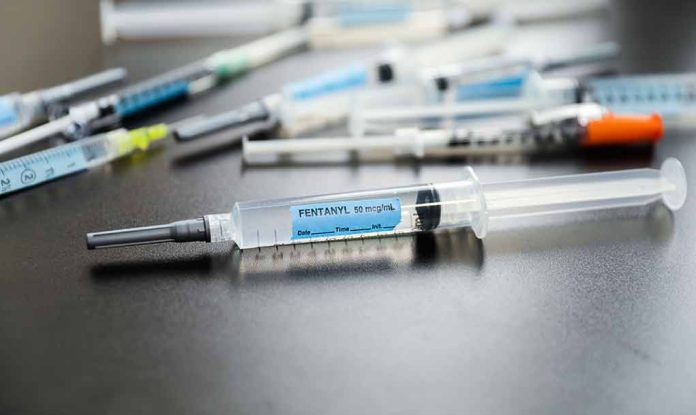
A bipartisan bill proposes charging fentanyl dealers with felony murder if their distribution results in death, intensifying repercussions for those contributing to the opioid crisis.
Key Takeaways
- A new bill introduced in Congress seeks to charge fentanyl dealers with felony murder if their drugs result in a fatality.
- Current legislation demands a minimum 20-year sentence but excludes murder charges for fentanyl distribution.
- The bill is spearheaded by Senator Joni Ernst and Representative Tony Gonzales and seeks to curb the opioid crisis.
- The bill aligns with National Fentanyl Awareness Day and proceeds to committee discussions.
- Since 2021, approximately 280,000 lives have been claimed by the crisis this bill purports to address.
- 64,000 pounds of fentanyl have been seized at the southern border, highlighting the drug’s infiltration.
Intensified Legal Measures
The newly proposed Felony Murder for Deadly Fentanyl Distribution Act presents a decisive stance against the opioid crisis. It aims to levy felony murder charges on fentanyl dealers whose substances result in death, significantly raising accountability measures. Present laws require a 20-year sentence for distribution, but this act steps further by introducing murder charges. Spearheaded by Senator Joni Ernst and Representative Tony Gonzales, the bill marks a strategic pivot in tackling the crisis, urging severe judicial actions to reduce opioid-related fatalities.
Communities continue to reel under the heavy toll of fentanyl, highlighted by estimates of nearly 280,000 deaths since 2021. As dealers exploit border vulnerabilities, law enforcement faces uphill battles. The Department of Homeland Security reports seizing nearly 64,000 pounds of fentanyl, sufficient to kill over 14 billion people. Over 90% of this drug is intercepted at Ports of Entry, emphasizing the complex border security challenges.
Fentanyl Tragedies and Advocacy
The legislative proposal coincides with key developments in Virginia, where the General Assembly passed two bills targeting fentanyl distribution. These bills focus on elevating penalties to involuntary manslaughter for sellers of fentanyl-laced drugs leading to death. Inspired by families affected by fentanyl-related deaths, like Lisa Reed who lost her daughter, these initiatives underscore the growing demand for legal reforms. Reed asserts, “This is definitely a huge step in the right direction. Parents should never have to bury their child.”
In response to pressing calls for justice, Virginia’s bills await Governor Youngkin’s signature to become law. The Felony Murder for Deadly Fentanyl Distribution Act also proceeds in Washington, coinciding with National Fentanyl Awareness Day—both initiatives pushing the envelope on dealer accountability. Advocates like Reed remain adamant in their message, emphasizing the need for persistent action and awareness to halt the deadly fentanyl epidemic.
Political and Public Support
Representative Gonzales notes that while border security falters, drug cartels exploit loopholes to flood communities with opioids. He comments, “My bill sends a strong message to those who work with cartels and other bad actors—if you sell the drug and take an innocent life, justice will be delivered.” Senator Ernst adds, “Increasing the severity of the punishment for the drug dealers responsible for the deaths of too many Iowans is long overdue.” Such firm positions resonate with public sentiments demanding stringent interventions.
The bill’s progression gives hope to those fighting the opioid tragedy, suggesting potential for significant legal shifts, empowering law enforcement, and offering fresh avenues to tackle the epidemic. By applying the full weight of the law, policymakers aim to staunch the fentanyl tide that threatens lives nationwide.





